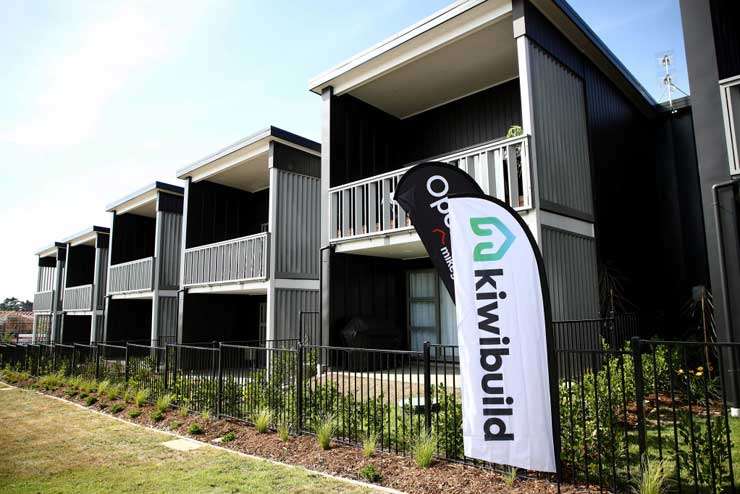Buying off the plan can lead to big savings in the amount of deposit house hunters on a budget need and is one of the cheapest ways to get into a brand-new home.
It’s also a method which secures a home at a fixed price and avoids the costly budget creep of what can be a highly emotional auction process, says a Kāinga Ora building partner.
READ MORE: Find out if your suburb is rising or falling
Tony Houston, the former owner of a large building franchise, is now managing director of the Neilston Group, the company behind prefabricated homes business Modul.
Start your property search
Over the years these companies have produced hundreds of homes for Kāinga Ora in suburbs such as Hobsonville Point.
Houston says auctions can be a big headache for people with limited spending, such as first home buyers, because they will just get blown out of the water by people with more money.
“If you’ve got $2m there’s not a housing crisis. If you’ve got $1m there’s probably not a housing crisis either but if you’ve got $650,000 or less we’ve got a problem, and there’s a massive amount of people in that position who are really struggling to get on the ladder and get their first home.”
Each time someone loses at auction they have to increase their budget to edge out the competition but that’s often futile when they are up against others with deeper pockets.
People also erode their budgets by paying over and over for builder’s reports and legal fees each time they decide to go for a house they like.
“You know, it costs you $1000 to have a builder’s report done and you miss out on three or four of them – that’s $3000 or $4000 you’ve lost.”

KiwiBuild homes in Auckland. For a $650,000 house a 5% deposit is only $32,500. Photo / Getty Images
Another problem budget buyers are running into is where once they might have been able to secure a “do up” property for a reasonable price, these days they are increasingly competing against developers in the auction room who are snapping up such properties for terrace housing.
Buying off the plan, however, means buyers can sidestep a lot of these issues. They don’t need a builder’s report, for example, and the bank might not require buyers with low deposits to pay even more for a valuation. With Kainga Ora homes buyers know they are getting a properly consented property with full building code compliance.
Off the plan properties sell for a fixed price, Houston says, but the really great part is buyers need only a fraction of the deposit compared to buying an existing home on the open market.
The Modul homes which go to a KiwiBuild ballot system for first home buyers are priced at $650,000 and require only a five per cent deposit instead of the more usual 20 per cent deposit to buy an already built home.
“The Government wants lots more new homes to be built so they’ve tried to make it more favourable for buying off the plans,” says Houston.
That means buyers don’t need to save as much for a deposit. For a $650,000 house a five per cent deposit is only $32,500 – compared to a 20 per cent deposit of $120,000.
This makes KiwiBuild homes much more affordable and accessible for first home buyers. Houston says the key to making money from that home is rather than worrying about paying off the mortgage too quickly, instead keep the house long term to make equity gains over time.
“They real key is to hold it. If we take that $617,500 (a $650,000 home minus the $32,500 deposit) and we do an interest-only loan and multiply that by say 2.4 per cent (mortgage rate) it equals $14,800 – divide that by 52 and it’s $285 a week to own a brand-new house.
“That’s a three-bedroom house. If you let one of the bedrooms out for $200 a week you can own a brand new house for $85 a week, and if you are single or a couple you may let the other bedroom out for another $200 and you get a brand new house and $115 a week in cash.”
For that buyers get a fully consented home with up to date in heating and insulation. It will possibly have a freehold title, and the home will also likely have made money by the time it is finished and ready to move in.
“That’s the beauty of it,” says Houston.
The only drawback is tough competition for the KiwiBuild ballots for the $650,000 homes, but Houston says buying off the plans is generally cheaper no matter who is building and selling.
“It definitely is because you are buying from people like us, developers, and we want volume. Say you live in a house and it’s the one asset you have you want to get the maximum you can for it but developers want to do 100 or 200 houses a year so we want to sell them at a lower price.
“We don’t want to sell one house at full retail, we want to sell 100 at wholesale because that gives us momentum to move forward.
“Generally buying off the plans you can get a much better deal because we’re looking for volume, not the last dollar in regard to price.”
Houston says more people are realising buying off the plan is an easy way to get on to the housing ladder and are relishing the fact they don’t have to compete at auction after auction in this hot housing market.
“If you’re a first home buyer and you’re living with mum and dad saving some extra money you’ve got the time to wait for it to be built and move into it. Because of that you get a discounted price.”
- This content was created in partnership with Kāinga Ora








